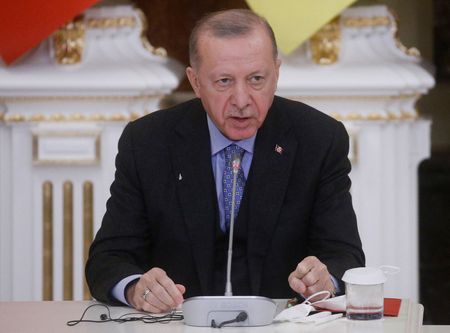
Factbox-Pact gives Turkey oversight of warship transit to Russia, Ukraine

ANKARA (Reuters) – Under the international Montreux Convention, NATO member Turkey has control over passage of vessels between the Mediterranean and Black Sea, making it a potentially key player in any military conflict between Russia and Ukraine.
Earlier this month, six Russian warships and a submarine transited Turkey’s Dardanelles and Bosphorus straits to the Black Sea for what Moscow called naval drills near Ukraine waters. Here are details of the pact and supervisory powers it grants to Turkey, which neighbours Russia, Ukraine, Romania, Bulgaria and Georgia on the Black Sea:
MONTREUX CONVENTION
The Montreux Convention was signed in 1936 after Turkey, concerned over expansionist moves in the region, asked the signatories of the 1923 Treaty of Lausanne for a change in the way the straits are monitored. It said circumstances had changed and requested full authority. After negotiations with world powers including the United Kingdom, the Soviet Union, France and others, it was agreed that Turkey would control the straits.
TURKEY’S POWERS
Under the accord, Turkey has control over the Bosphorus and Dardanelles and the power to regulate transit of naval warships. It also guarantees the free passage of civilian vessels in peacetime and restricts the passage of ships not belonging to Black Sea countries. In wartime, Turkey is authorised to close the straits to all foreign warships or when it is threatened by aggression. It can also refuse transit for merchant ships from countries at war with Turkey and to fortify the straits in case of conflict.
All non-Black Sea countries wishing to send vessels must notify Turkey 15 days in advance, while Black Sea nations must give eight days notification. Passage is limited to nine warships of a specific aggregate tonnage at any one time, with no ship above 10,000 tonnes allowed to pass. A non-Black Sea country’s ships cannot exceed a total 30,000 tonnes at any time, and the vessels are allowed to stay in the region no more than 21 days. Black Sea states may transit ships of any tonnage.
Black Sea countries can send submarines through the straits with prior notice, as long as they have been built, purchased or sent for repair outside the Black Sea. Civil aircraft can be transited along routes authorised by the Turkish government. The accord does not contain restrictions on the passage of aircraft carriers, but Ankara says it has control over that as well.
The 1994 United Nations Convention on the Law of the Sea has prompted calls for a revision of Montreux. But Turkey is not a signatory of the accord due to its longstanding disputes with Greece, so the pact has remained.
TURKEY’S OPTIONS
Since tensions flared over Ukraine, Turkish officials have said only that Montreux is instrumental in keeping regional peace. They have not specified what position Turkey would take in the event of a war. President Tayyip Erdogan has said Turkey will do what is necessary as a NATO ally if Russia invades, without elaborating. Turkey is reliant on Russia for energy and tourism, and has forged close cooperation with Moscow on energy and defence in recent years.
In 2008, when Russia recognised the independence of the two Georgian regions of Abkhazia and South Ossetia, Ankara rejected U.S. requests to let its warships pass the straits at a time when it depended on Russia for commodities and trade. During World War II, the Montreux accord prevented the Axis powers from sending naval forces through the Straits to attack the Soviet Union.

















POST COMMENTS (0)